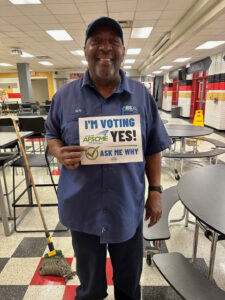Thousands of area janitors, bus drivers and cafeteria workers lose union representation, due to 60% hurdle.
By Noah Vinsky
Original Air Date: December 6, 2024
Host: Unions have been on a roll in Southwest Florida lately. Warehouse workers, truckers, bank tellers and baristas have joined unions in droves over the last two years in this region. But the picture is mixed for public-sector employee unions, as the Republican state legislature has made it harder for them to be recertified. School teachers’ unions throughout the state have cleared the new obstacles with flying colors, but the story looks different for groundskeepers, school bus drivers, cafeteria workers, maintenance workers and the like. Noah Vinsky has that story.
Noah Vinsky: Public-sector unions are under duress in Florida, with state legislation making it harder for government employees to organize. Senate Bill 256, which was signed last May, requires unions to maintain a 60% membership rate or face dissolution. As of this September, more than 63,000 public sector employees have lost union representation, according to state records.
That includes 200 Tampa airport employees; 160 City of Bradenton employees; more than 1,500 USF non-teaching employees, 450 USF adjunct professors; more than 800 St Petersburg College adjuncts and 1,500 Hillsborough Community College adjuncts.
Stephanie Yocum is the vice president of the West Central Florida Labor Council and president of the Polk Education Association. She says that these bills have made it hard for regular working people to gain union representation.

Custodian seeks union. Courtesy AFCSME
Stephanie Yocum: For as long as Florida’s really been around, we’ve been really a “Right to Work” state, and so it’s always been hard for regular working people to organize through their union. But our legislature over the last few years has decided to make it even more difficult for people to actually be a part of their union and to build people power. And that’s really what these union-busting bills have all been about; they want to hold power and they want to keep regular people from having any kind of power. And so the way to go after people’s power is through organized labor. And so that’s what we’re really seeing here.
NV: The Polk Education Association represents more than 9,000 teachers and educational support personnel in the Polk County Public School District . The American Federation of State, County, and Municipal Employees (AFSCME) represents the custodians, bus drivers, and cafeteria workers.
Although AFSCME Local 2227 was able to stay intact, Yocum says that only bus drivers were able to recertify, leaving other vital employees without representation.
SY: We’re losing representation just because of this law. And it’s really unfortunate because Florida, the rights are organized and collectively bargained in our constitution, yet our legislature time and time again shows their contempt for the constitution by writing bills that directly go against everything that our constitution stands for.
NV: Yocum calls these anti-union measures “retaliatory.”
SY: It’s retaliatory in the fact that we have a governor who, if you don’t agree with him, he comes after you. And that has been his M/O. And he’s done it with corporations even like Disney when they’ve come out against him, in certain legislation, he’s tried to come after them.
But this is also broader, this was happening before Ron DeSantis was even governor. We’ve had attempt after attempt of the corporate greed wanting to bust up people power, and unions are people power. And it’s been a concerted effort, not just in Florida, but across the country. Back in 2010, Wisconsin lost collective bargaining rights. And it’s really started, and it’s been an attack on working people because if they keep working people unorganized and isolated, then there’s no real way for people to fight back against what corporations and corporate oligarchs do to our country.

Stephanie Yocum
NV: The University of South Florida recently privatized 400 jobs in food services custodial, maintenance, and groundskeeping work, something the university touted as a “cost-cutting move.” USF landed a deal with Compass Group, replacing Aramark as the university’s dining services contractor.
Higher-education unions — particularly those representing part-time professors — have also been hit hard by the legislation. Eight unions representing adjunct professors at public colleges in Florida have been decertified earlier this year.
The state’s “anti-woke” attack on public school curriculum has affected school teachers, and Yocum says that’s been difficult. However, she sees the scales tipping back.
SY: It’s going to take a little bit, and I think it’s going to take people realizing their own power when we stand up and fight together in our communities. And it’s so interesting to me, because if you look at this last election, working people lost a lot, but we also gained a lot. Our communities over Florida have said, “We support strong public schools,” when they pass 24 out of the 25 millage and tax referendums to support public schools. We were able to defeat Amendment 1 to polarize and partisan our school boards. We were able to defeat that because people don’t want politics in their schools, and we don’t want partisanship influencing our schools and our school board. So I think that we are seeing people stand up and fight back.
NV: So, what’s the future for unions in Florida?
SY: They’re going to continue to attack working people as long as our legislators are owned by corporate lobbyists and corporate greed. But I don’t see the future as being bleak, because I think in the last two years, what we have seen as a state and even across the country, is that Americans support unions, just like they support strong public schools. And so we are seeing a regeneration of labor and organized labor, and what really this law has done — and speaking from a teacher standpoint, when you put hurdles in front of teachers, we find ways around them, because that’s what we do. And so, we are finding newer, better ways to organize people. And this is unfortunate that our legislature continues to attack working people, but at the end of the day, we’re just being better organizers. And I think that the future of labor is bright. We’re coming out of this dark time better.
NV: This has been Noah Vinsky for WSLR News.
WSLR News aims to keep the local community informed with our 1/2 hour local news show, quarterly newspaper and social media feeds. The local news broadcast airs on Wednesdays and Fridays at 6pm.